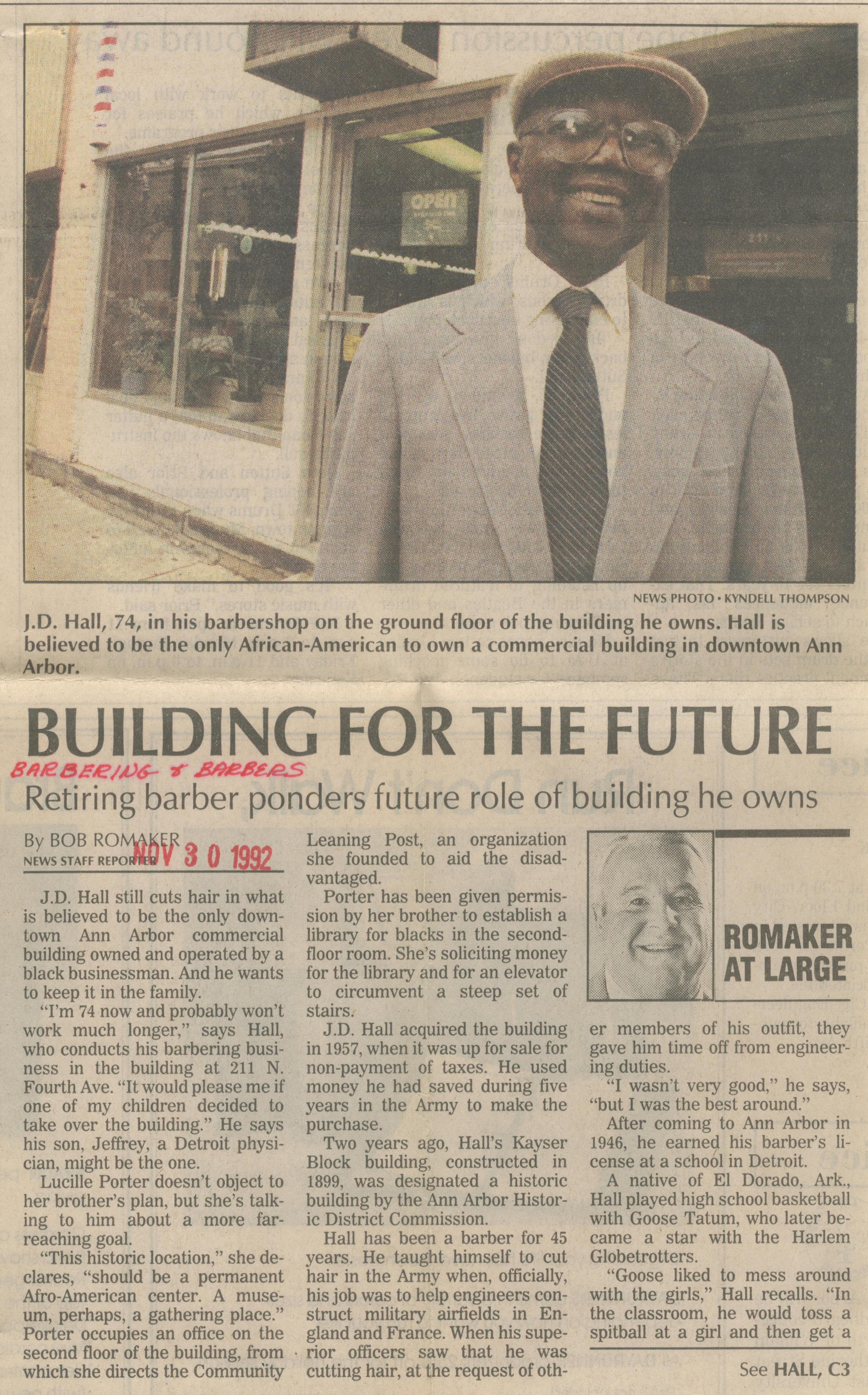Building For The Future


J.D. Hall, 74, in his barbershop on the ground floor of the building he owns. Hall is believed to be the only African-American to own a commercial building in downtown Ann Arbor.
BUILDING FOR THE FUTURE
Retiring barber ponders future role of building he owns
By BOB ROMAKER
NEWS STAFF REPORTER
J.D. Hall still cuts hair in what is believed to be the only downtown Ann Arbor commercial building owned and operated by a black businessman. And he wants to keep it in the family.
"I'm 74 now and probably won't work much longer," says Hall, who conducts his barbering business in the building at 211 N. Fourth Ave. "It would please me if one of my children decided to take over the building." He says his son Jeffrey, a Detroit physician, might be the one.
Lucille Porter doesn't object to her brother's plan, but she's talking to him about a more far-reaching goal.
"This historic location," she declares, "should be a permanent Afro-American center. A museum, perhaps, a gathering place." Porter occupies an office on the second floor of the building, from which she directs the Community Leaning Post, an organization she founded to aid the disadvantaged.
Porter has been given permission by her brother to establish a library for blacks in the second-floor room. She's soliciting money for the library and for an elevator to circumvent a steep set of stairs.
J.D. Hall acquired the building in 1957, when it was up for sale for non-payment of taxes. He used money had saved during five years in the Army to make the purchase.
Two years ago, Hall's Kayser Block building, constructed in 1899, was designated a historic building by the Ann Arbor Historic District Commission.
Hall has been a barber for 45 years. He taught himself to cut hair in he Army when, officially, his job was to help engineers construct military airfields in England and France. When his superior officers saw that he was cutting hair, at the request of other members of his outfit, they gave him time off from engineering duties.
"I wasn't even very good," he says, "but I was the best around."
After coming to Ann Arbor in 1946, he earned his barber's license at a school in Detroit.
A native of El Dorado, Ark., Hall played high school basketball with Goose Tatum, who later became a star with the Harlem Globetrotters.
"Goose liked to mess around with the girls," Hall recalls. "In the classroom, he would toss a spitball at a girl and then get a 'who me?' look on his face when the teacher questioned him."
But it wasn't all fun and games for Hall in Arkansas. A sensitive man, he was deeply disturbed by the racist double standard: separate restrooms and lunchrooms for whites and blacks and unequal pay for equal work. He remembers vividly how the queue system worked: "If a black person was first in line, he had to step aside if a white person joined the line. I always though this was wrong."
As a member of the Ypsilanti Township Board of Trustees since 1976, Hall has argued consistently for more black representation on township commissions. He also is a former member of the Ypsilanti Board of Education.
"As a public man" who "knows a lot about people," Hall gets satisfaction from having a voice in how things are run, for both whites and blacks. And he takes pride that "all of my life I have worked for I've got" and "I have always paid my bills."
But the major accomplishment in his life, he says, is helping to raise five children, all of whom obtained college degrees.
A widower since 1980, Hall says he and his wife Maureen, a school teacher who graduated from Alcorn State, pushed college into their children's heads.
In addition to Dr. Hall, the graduates are Donald, an engineer in California; Diane, a teacher in Grand Rapids; Pamela, a marketing specialist in Houston; and Donna, who works for a bank in Ann Arbor.
Hall calls the purchase of his North Fourth Avenue building "One of the best moves I ever made." Since he moved in, he has been renovating the structure and possibly paving the way for future occupancy by his children or as a permanent cultural center for blacks.
Article
Subjects
Robert L. Romaker
Barbers
Ann Street Black Business District
Hall's Barber Shop
Community Leaning Post
Kayser Block
Ann Arbor Historic District Commission
World War II
Ypsilanti Township Board of Trustees
Ypsilanti Board of Education
Colored Welfare League
Racial Segregation
LOH Community Centers
LOH Entrepreneurship
LOH Entrepreneurship - Ann Street
Old News
Ann Arbor News
J. D. Hall
Jeffrey Hall
Goose Tatum
Maureen Hall
Lucille H. Porter
Kyndell Thompson
209-211 N Fourth Ave